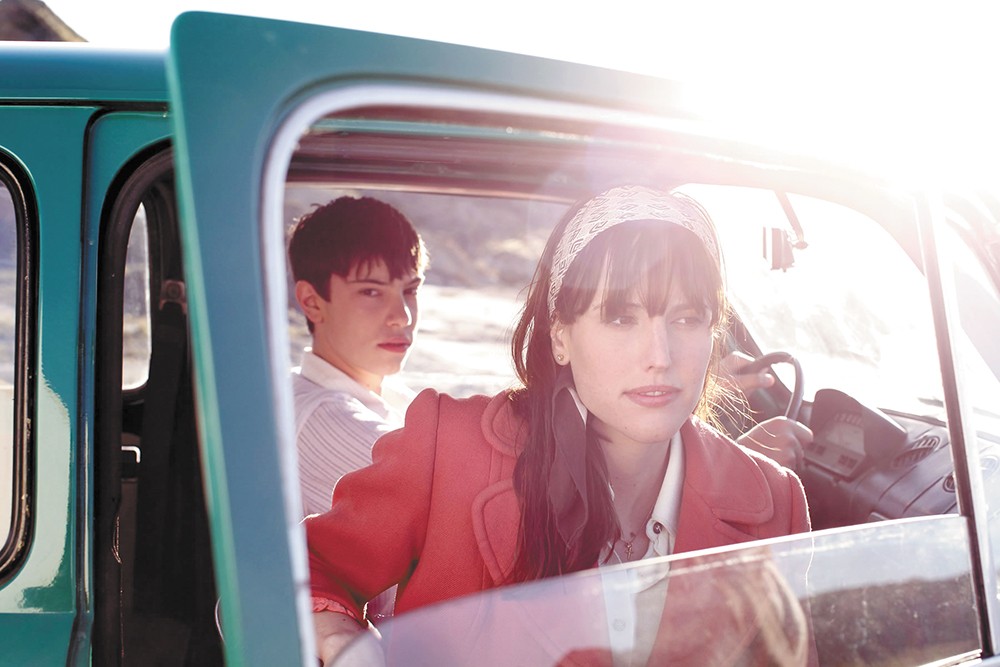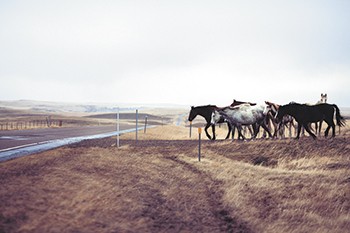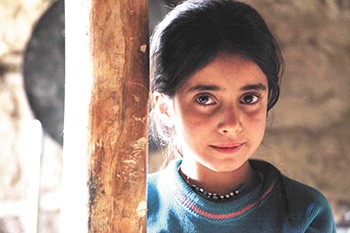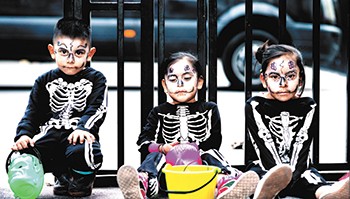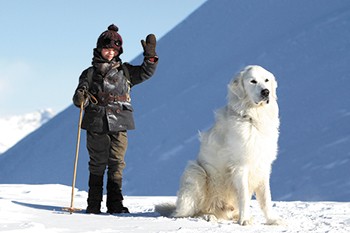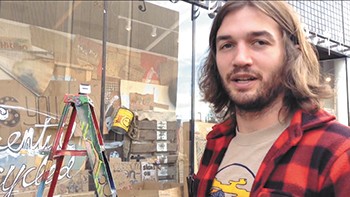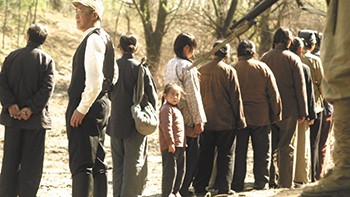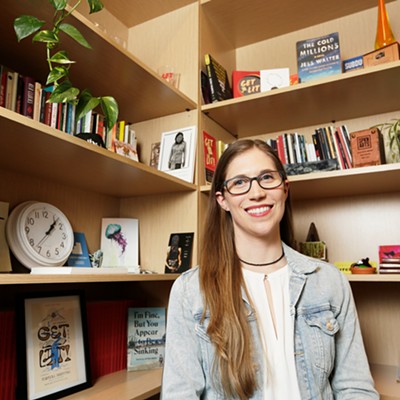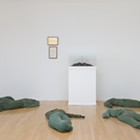After 16 years, the Spokane International Film Festival undoubtedly finds it harder to top its previous line-up, but organizers have done it again with an outstanding slate of features, documentaries, shorts and animated films. After previewing most of 2015's selections, the festival's theme emerges — an introspective look into the myriad ways humans deal with the tragedies, challenges and desires we encounter in life. Even more, these films examine how we begin to heal from these experiences. We hope you laugh, cry and reflect as much as we did.
— CHEY SCOTT, section editor
VIVIR ES FÁCIL CON LOS OJOS CORRADOS (LIVING IS EASY WITH EYES CLOSED)
Thu, Feb. 5, at 7 pm; AMC, 108 minutes
This brilliant twist on a road movie is Spain's official entry for Best Foreign Language Film at the 2015 Academy Awards, and with good reason. The script is full of humor and heart, and the film is full of excellent performances, from the largest role to the smallest, as well as stirring music and some majestic Spanish scenery. Vivir es fácil con los ojos corrados has already won Goya Awards (Spain's version of the Oscars) for Best Picture, Best Director, Best Actor, Best New Actress, Best Screenplay and Best Original Score.
A dedicated teacher named Antonio in 1966 Spain uses Beatles lyrics to teach his students English, and when he hears that John Lennon is in the country filming a movie, he hops into his car to try and meet the star and get some explanation for lyrics that he can relay to his young charges. On the drive, Antonio picks up a young pregnant woman, Belén, hitching her way to a meeting with her mother, as well as a 16-year-old boy named Juanjo who is running away from an abusive father. The trio quickly forms an ad hoc family; Antonio's passion for life and learning buoys the young car mates' spirits as they find themselves in a remote, gritty beach town, hot on the Beatle's trail.
Musicians Pat Metheny and Charlie Haden construct a brilliant soundtrack to the trio's adventures, and Javier Cámera as Antonio and Natalia de Molina as the pregnant Belén easily pull the audience into their burgeoning relationship, and into a film that leaves audiences full of joy at its passion for never-ending possibilities. (DAN NAILEN)
THE WOUND AND THE GIFT
Sat, Feb. 7, at 11:30 am; Magic Lantern, 80 minutes
Never in the history of human civilization has our species' relationship with the countless other living inhabitants of this world been more complex. American/Japanese filmmaker Linda Hoaglund compels audiences of her moving documentary to question the vast differences between humans who devote their entire existence to saving and protecting animals that are so savagely neglected and abused by others.
Weaving the narratives of several animal rescue groups and individuals into a Japanese fable about a peasant who saves a crane wounded by a hunter's arrow, The Wound and the Gift takes viewers around the world on an emotional and philosophical quest. The film introduces a remote Colorado wolf-dog sanctuary that provides permanent homes to the artificially created canid hybrid. In another remote area of the state, Hoaglund introduces a man whose 700-acre property houses 300 exotic animals that have relearned to trust humans after surviving horrific treatment. In the film's trailer, sanctuary owner Pat Craig greets a rumbling tiger named Simon who casually lumbers over to be petted by his master and protector. "Saving one animal may not change the world, but surely for that animal, the world has changed forever," Craig notes.
Director Hoaglund is scheduled to attend the screening. (CHEY SCOTT)
THE VANQUISHING OF THE WITCH BABA YAGA
Sat, Feb. 7, at noon and Thu, Feb. 12, at 6:45 pm; Magic Lantern, 73 minutes
In an eerie, foreboding mix of children's storybook animation and raw, anthropological footage of modern-day Eastern Europe, The Vanquishing of the Witch Baba Yaga examines the metamorphosis of fear in the troubled region. Interspersed between the retelling of a Slavic folk tale about Baba Yaga, a cannibal witch living deep in the forest, director Jessica Oreck compares contemporary worries with the memories of past fears in Eastern European society. No longer do its people fear the unknown quiet of the forest, but worse fates — war, famine, destruction, corruption.
Through shaky camera angles, a jarring soundtrack and raw, unnarrated footage of high-rise tenement buildings, streetscapes, churchgoers and rural farmers, Oreck shows how Baba Yaga's myth has, over generations, become a simpler story about how the forest and nature can also protect us from humanity's worst. Oreck's most recent project, Aatsinki, was screened at SpIFF last year. (CS)
WHERE GOD LIKES TO BE
Sat, Feb. 7, at 4:30 pm; Bing Crosby Theater, 72 minutes
Tucked away deep in Big Sky country, there is a world often missed by those who are not looking. The Blackfeet Indian reservation is home to a kindhearted people who ask very little of the world around them. This beautiful film reveals the paralytic nature of stereotypes and debunks the archaic idea of what it means to be Native American, revealing that identity surpasses ethnicity or upbringing, but is intrinsically tied to history.
The breathtaking nature shots and steady narrative mirror the slow rhythm by which the Blackfeet live their lives. Get a glimpse of what life is like for three young people struggling between the choice of maintaining their traditions at the risk of isolation and poverty, or leaving all they know behind in order to seek new opportunities.
The film's subject Andrea Running Wolf is scheduled to attend. (COURTNEY BREWER)
WILDLIKE
Sat, Feb. 7, at 7 pm; Bing Crosby Theater, 104 minutes
Mackenzie is running. Running from her father's death. Running from an uncle who can't keep his hands to himself. Running from shame.
When her unstable mother sends her to Alaska for the summer to live with her uncle (whose name is never revealed) after losing her father the previous year, Mackenzie's future looks bleak. A few days of monosyllabic conversations and cordial outings create the illusion that perhaps she will achieve some normalcy after all. This illusion is shattered when her uncle makes his way into her bed, driving her to the conclusion that her only option is to run away. With her uncle constantly closing in on her, Mackenzie finds herself desperate to get to Seattle at any cost. Bruce Greenwood plays a recently widowed, solitude-seeking hiker who Mackenzie follows like a shadow after stumbling into his room at a lodge in the woods. The unlikely bond formed by surviving in the mountainous Alaskan terrain proves to be the key to each of them moving forward. In spite of its gut-wrenching introduction, this film is not about trauma, but healing. Two sojourners seeking to heal from their traumatic pasts explore the Alaskan wilderness. WildLike is an enthralling contrast of the sick realities of life and the hope of learning to trust again. (CB)
FLORE
Sun, Feb. 8, at 11:30 am; Magic Lantern, 92 minutes
Both an indictment of our prescription drug culture and a profound message of hope for anyone on a journey of recovery of any kind, director Jean-Albert Lièvre's documentary chronicles his mother Flore's battle against Alzheimer's disease with a touching sense of reverence. Initially housed in a medical facility under the crushing weight of a drugged stupor, Lièvre moves his mother to a breathtaking estate in Corsica. The move proves reinvigorating, as Flore begins to show signs of improvement. This screening will be hosted by Frederic Dugenet, lecturer in World Languages and Cultures at Whitworth University. (TRACE WILLIAM COWEN)
THE LAST SEASON
Sun, Feb. 8, at 2 pm; Magic Lantern, 78 minutes
At first glance, it appears the documentary The Last Season is about two men who hunt for mushrooms in central Oregon, a plot that could put many to sleep. In reality, it's about adopted family, the nightmares brought on by the Vietnam War and the perils of getting old. The story follows gruff Vietnam veteran Roger Higgins, 75, and strong-willed Cambodian refugee Kouy Loch, 46, who have much more in common than just a love for tracking the elusive matsutake mushroom, prized for its spicy, aromatic odor. The pair form a striking bond because of their many similarities (i.e., experiences of war); they absolutely understand each other. The film is told over the course of one mushroom hunting season, which may very well be Higgins' last. Bring a box of tissues to this one, but expect to laugh out loud too (Higgins' rapport with his wife is downright hilarious). (LAURA JOHNSON)
THE TALE OF THE PRINCESS KAGUYA
Sun, Feb. 8, at 4 pm; AMC, 2 hours and 17 minutes
Those unfamiliar with Princess Kaguya, the leading lady of Japan's oldest and most famous folk tale, should know first that the sweeping, emotional story doesn't have a sugar-coated ending. You may cry more than once throughout the visually breathtaking, hand-drawn animated film. But don't let the hint of sadness keep you from meeting the magical Princess in this Academy Award-nominated film (for best animated feature) from legendary Japanese filmmaker Isao Takahata, a co-founder of Japan's Studio Ghibli, known for the animated classics My Neighbor Totoro, Spirited Away and The Wind Rises.
From a simply artistic standpoint, the soft, pastel-hued watercolor and colored pencil-esque animation is a refreshing break from the computer animation we've come to expect. With an emphasis on showcasing the natural beauty of the Japanese countryside — Kaguya's beloved home — in spring and summer, the attention to detail in each frame is astounding. Bees buzz around brightly blooming flowers, grass waves in the breeze and inchworms creep up plant stems.
The film doesn't stray from its folk-tale origins, also known as The Tale of the Bamboo Cutter. One day, Kaguya's adoptive father, Taketori no Okina, is working in his bamboo fields when he discovers a glowing shoot that springs from the earth, opening to reveal a tiny human princess. Okina takes the sprite back to his wife, Ona, and they raise her as their own. The tiny baby girl grows as fast as a bamboo shoot, earning her the nickname Little Bamboo. One day, Okina discovers treasures — gold and fine silks — inside a bamboo stalk in the forest, and decides it's a sign that his daughter is meant to become a noble princess. The remainder of the story follows Kaguya's struggles to adapt to a life of privilege she has no desire for, including the greedy male suitors who fall over their feet to win her affections. (CS)
ADIEU AU LANGAGE (GOODBYE TO LANGUAGE)
Sun, Feb. 8, at 6:45 pm; AMC, 70 minutes
Those unfamiliar with Jean-Luc Godard's work should go into this film knowing that the iconic French-Swiss director has an infatuation with innovation and the abstract. From the beginning of the film, it's clear the plotline of Adieu au langage will take a back seat to its cinematic techniques in Godard's first 3-D production.
The film follows two sets of couples, each consisting of a single man and a married woman. Although the couples experience incredibly similar moments that clearly mirror one another, they're separated into two individual story lines, titled "1 Nature" and "2 Metaphor." The film switches between these two story lines, making sure to showcase similar events the couples experience back-to-back. The plot is further tied together by one character who exists in both of the seemingly parallel universes — Godard's dog, Roxy.
Though the respective couples' separate stories are captivating, the film's highlight is Godard's intricate and unique, albeit slightly confusing, cinematic choices. (KAITLYN ANSON)
KUMIKO, THE TREASURE HUNTER
Mon, Feb. 9, at 6:30 pm; Magic Lantern, 105 minutes
Loosely based on the media-perpetuated urban legend surrounding the death of Takako Konishi, this David Zellner-directed fable is a bona fide revelation. At once a loving homage to the often intimate relationships we share with our favorite films (in this case, the Coen Brothers classic Fargo) and a daring exploration of the dangers of obsession, Kumiko weeps with joy, thanks to Rinko Kikuchi's magnetic performance. Previously nominated for an Oscar for her role in Birdman director Alejandro González Iñárritu's 2006 film Babel, Kikuchi brilliantly reconciles the character's often disparate worlds. The story alone is fascinating, as we see a woman who comes to believe that the buried money in Fargo is actually hidden somewhere in the U.S. and goes searching for it. (TWC)
SONG FROM THE FOREST
Tue, Feb. 10, at 6:30 pm; Magic Lantern, 98 minutes
German director Michael Obert found a remarkable subject for his first film when he met American Louis Sarno, a man who became so obsessed with some mysterious sounds he once heard on the radio that he dedicated his life to following the music. The journey took him all the way to the Central African Republic's dwindling rainforest to live among a tribe of pygmies called the Bayaka. Sarno became a fully accepted member of the tribe, staying in Africa for decades save the occasional trip back home to New York City, even marrying and having a son, Samedi. Song from the Forest visits Sarno in Africa and shows his life among the natives, as well as delving into the music that combines tribal members singing and shouting alongside the sounds of wind in the trees, bubbling water and native wildlife. Obert's interviews with members of the Bayaka about this white man who insinuated himself into their lives are priceless and revealing. (DN)
COME TO MY VOICE
Wed, Feb. 11, at 6:30 pm; Magic Lantern, 105 minutes
Come to My Voice brilliantly brings to SpIFF a multigenerational tale that Americans will be able to relate to, yet are unlikely to have experienced. Director Huseyin Karabey's film focuses on a Kurdish village under constant harassment from their government. The story focuses even more narrowly on two women living in the village: Jiyan, a young girl wise beyond her years, and Berfe, her grandmother. The plot jolts into action when the army enters the community demanding that all weapons be turned over; when none are, all the men in town are arrested. This includes Temo, Jiyan's father and Berfe's son. Berfe and Jiyan band together, trying to hash out a plan that will satisfy the army and get Temo back home. The film presents a touching story of familial connection, sorrowfully stained with immense political unrest. (KA)
WALKING UNDER WATER
Wed, Feb. 11, at 6:45 pm; Magic Lantern, 76 minutes
This documentary from director Eliza Kubarska delves into the culture of Borneo by immersing the viewer in the increasingly difficult lives of the Badjao, sea nomads facing opposition from the growing fishing and diving resort industries. Kubarska follows Sari, a young man embarking on his very first fishing trip with his uncle Alexan — a trip that serves not only as a rite of passage for young Sari, but a glimpse of the daunting reality facing an entire community. (TWC)
QUE CARAMBA ES LA VIDA
Thu, Feb. 12, at 6:30 pm; Magic Lantern, 88 minutes
Director Doris Dörrie takes to the plazas, alleys and community centers of Mexico City to introduce viewers to several generations of women struggling to crack the male-dominated world of mariachi music. The film, like the music performed throughout, is an inspiring, colorful sampling of a vibrant folk culture. But it comes with a serious undercurrent of heartbreak and darkness; Dörrie showcases a single mother responsible for supporting both her daughter and her own mother by singing late into the night in hopes of being tossed a few pesos by strangers. Many of the singers and musicians talk about dealing with macho and disrespectful drunk and drugged-up men as just a matter of a normal night as a mariacha, and the toll of job insecurity and emotional abuse comes through loud and clear. You can hear the sadness in the songs' lyrics about death, love and poverty.
But it's not all gloom and doom, as the performers' dedication to the artistry of the traditional folk songs is remarkable. Dörrie tracks down the first all-woman mariachi band, formed in 1958 and still performing, and those women praise the music's ability to transform them from their everyday lives: "When I'm playing, I remember being young," one says. (DN)
MISS HILL: MAKING DANCE MATTER
Fri, Feb. 13, at 5:30 pm; Bing Crosby Theater, 84 minutes
Dance as an art form is an obvious reality to us now, but at the turn of the 20th century, many people deemed it a sin, and most thought it a form of exercise... for women. Martha Hill changed all of that, according to the new documentary Miss Hill: Making Dance Matter. As the first director of dance at the Juilliard School (from 1951 to 1985), Hill was instrumental in changing Americans' perspective on modern dance. Her story is told over the course of 90 years, using archival footage of her dancers and personal interviews where she delves into her life history. (LJ)
CHARLIE'S COUNTRY
Fri, Feb. 13, at 8 pm; Bing Crosby Theater, 108 minutes
The Australian outback, aka the bush, is wide and miraculous; it's also nearly impossible to survive in alone. But in the Australian drama Charlie's Country, one poor aboriginal man, who feels out of place in a small community increasingly forced to follow "whitefella" laws, heads out into the wilderness to get back to his roots. Caught in a torrential rainstorm, he soon finds himself on the brink of death in a hospital. This film is slow-moving and heartbreaking, giving us a deeper look into the racism that still exists in our world. David Gulpilil won Best Actor at last year's Cannes Film Festival for his role as Charlie. (LJ)
A GIRL WALKS HOME ALONE AT NIGHT
Sat, Feb. 14, at midnight; Garland Theater, 99 minutes
Perhaps you thought that vampire-themed films were over with. You thought wrong. In director Ana Lily Amirpour's Iranian vampire western (the first of its kind), horror lurks in the form of a lonesome "young" female vampire who stalks the citizens of Bad City — specifically, men who treat women cruelly. The film's characters live in a space surrounded by old artifacts like record players, leather jackets and vintage cars, as well as more ominous things like rusty heroin spoons and an endless desert of oil wells. This film, shot in crisp black and white, is confident and cool, infinitely better than any contrived Bella/Edward love story. (LJ)
EVAPORATING BORDERS
Sat, Feb. 14, at 11:30 am; Magic Lantern, 73 minutes
What happens when you can no longer go home? For filmmaker Iva Radivojevic, this conundrum is all too real. In a time where populations are ever-fluctuating and migrating, the idea of borders — both physical and social — is being redefined. By paralleling a migrant's journey and the universal journey of self-discovery, Radivojevic portrays "what it means to have a hybrid existence in which one is always searching for an identity." This visual essay allows audiences to experience the effect of cultural oppression in a world where cultures are intertwined more than ever. By obliterating traditional views of selfhood, the narrator provokes the audience to disassociate culturally constructed paradigms, and how we interact with those we come in contact with. (CB)
THREE WINDOWS AND A HANGING
Sat, Feb. 14, at 2 pm; Magic Lantern, 94 minutes
This film is as far from flashy as it gets. No special effects, no gimmicks, no pizazz. And that's exactly what allows it to leave viewers both emotionally appalled and utterly speechless. Three Windows and a Hanging can only be described as a film of great, horrendous injustice, and an examination of how injustice of that sort has a way of manifesting itself in people as either immense bravery or astounding, cowardly weakness.
In a traditional Balkan village where the hierarchy dictates that old men are superior to young men, young men are wiser than kids, and no woman should dare claim to know anything, rebuilding a community after a catastrophic period of war is anything but simple. The subtitled film follows a variety of characters; the most notable is Lushe, the town schoolteacher. Audiences immediately find out that Lushe was raped by soldiers during the war, an experience so horrid and unjust that she finds herself telling her story to an international journalist. When the mayor discovers this, he chooses to shun Lushe and her son.
The film addresses hierarchal and gender inequality injustices in the most powerful way imaginable, through the eyes of those experiencing it and those who allow it to continue. (KA)
BELLE AND SEBASTIAN (BELLE ET SEBASTIEN)
Sat. Feb. 14, at 4:30 pm; AMC, 104 minutes
No, this is not a film about the indie-pop darlings who share this name. Actually, that band took its name from the children's book from which this French film was adapted. This new take on the beloved French story is a gorgeously shot film that uses the breathtaking vistas of the French Alps to add some levity to a serious piece of history. Sebastian is a young boy living with his grandfather (he says his mom went off to America) in a mountain village in Nazi-occupied France who watches as members of his village escape over the mountains and into Switzerland. We hear about a "beast" that's been killing the village's sheep, but that doesn't stop Sebastian from wandering in the hills until he eventually finds the beast, actually a wayward dog that he names Belle. This beautiful film from director Nicolas Vanier is a story of friendship and doing the right thing that kids will dig, but older folks can appreciate for its historical value. (MB) ♦
SPECIAL SCREENINGS
BEST OF THE NORTHWEST
Fri, Feb. 6, at 5:30 pm; Bing Crosby Theater, 76 minutes
Those hip to the local filmmaking scene should recognize a few names in this collection of short films made in the region. Some of the films were finalists in last year's 50 Hour Slam, but others will debut publicly at the festival. Look for work from Rajah Bose, Ian Ebright, Lyle Pisio, Kendra Ann Sherrill, Adam Boyd, Jeff Rutherford, Dave Kotlan, Tom Meisfjord, Austin Stiegemeier (pictured) and Sean Finley. (MIKE BOOKEY)
ANIMATION SHOWCASE
Sat, Feb. 7, at 2 pm and Tue, Feb. 10, at 6:45 pm; Magic Lantern, 95 minutes
This year, SpIFF's animation showcase features work from Canada, Ireland, Hungary, the Netherlands and the U.S. From the playfully abstract to the slyly confrontational, 2015's selections again prove the dual power of brevity and animation.
Bus Story, directed by Tali, chronicles the devolution of idealism between a bus driver and her boss named Killer. CODA, an Oscar-shortlisted entry and 42nd Annie Awards nominee, is the latest short film from the Ireland-based And Maps And Plans studio team of Alan and Shane Holly. Perhaps best known for their art direction on Ice Age, Ratatouille and Toy Story 3, directors Robert Kondo and Dice Tsutsumi bring a young pig to the big screen (with narration by Lars Mikkelsen of the BBC's Sherlock) in The Dam Keeper.
Set to the music of Tchaikovsky, Marie-Josée Saint-Pierre's Flocons celebrates the life and career of animator and director Norman McLaren by building a story around animation tests taken from the production of the 1957 classic A Chairy Tale. Me and My Moulton, another Oscar-shortlisted entry, focuses on the tension created between two sisters and their architect parents in the wake of a bicycle request. Janet Perlman, known by many for her Oscar-nominated 1981 film The Tender Tale of Cinderella Penguin, tackles digital reliance by way of a paranoid dog with high cholesterol and a penchant for origami and ice cream in Monsieur Pug. Canadian duo Nicola Lemay and Janice Nadeau simultaneously tackle the consequences of war and the power of friendship with No Fish Where to Go. (TWC)
On the experimental front, the much buzzed-about Symphony No. 42 — recently named one of five must-see shorts at this year's Sundance Film Festival by Indiewire (alongside work from Don Hertzfeldt and Lena Dunham) — inventively weaves together 47 different observations on the irrational connections between nature and humans. Helmed by Hungarian director Réka Bucsi, Symphony No. 42 represents an apparent theme of this year's animation showcase — cerebral innovation. Pete Porter, director of SpIFF and chair of Theatre and Film at Eastern Washington University, hosts this celebration of brave individualism. (TRACE WILLIAM COWEN)
INTERNATIONAL SHORTS
Sun, Feb. 8, at 2 pm and Mon, Feb. 9, at 6:45 pm; Magic Lantern, 87 minutes
Hosted by Adam Boyd, SpIFF's assistant director and visiting professor of film at EWU, this year's selection of international shorts makes the cross-continental journey from joyous bluegrass — Brad Pattullo's stop-motion celebration of Southern eccentricity in Indian Ate the Woodchuck — to an interrupted suicide attempt in veteran UK commercial director Pete Riski's confrontational Here With Me. Further along the journey, viewers also face the intimidating rite of passage at the heart of Javier Macipe's Os Meninos do Rio. Elsewhere, China makes an unquestionably strong showing with Yatao Li's Carry On, chronicling the brutal withdrawal of Japanese forces during WWII through the eyes of a protective Chinese patriarch. Spain tackles climate change by imagining a futuristic Antarctica in Bruno Zacarías and Macgregor's Similo, while simultaneously managing the bravery necessary to merge two seemingly disparate genres — thriller and rom-com — in the Roberto Goñi triumph El Hombre Equivocado. (TWC)
THE LIGHTER SIDE OF CRIME
Sun, Feb. 8, at noon and Sat, Feb. 14, at 2 pm; Magic Lantern, 89 minutes
Sweden and the Netherlands come together in a farcical storm of armed robbery and seedy blackmail with a special pairing of films for SpIFF's "The Lighter Side of Crime" mini-program. Pairing John Hellberg's cash-grab mini epic Mousse with Jeroen Annokkee's chainsaw-assisted mob romp Eddy & Coby, this double feature provides ample opportunity to find the potential humor in lawlessness. (TWC)

